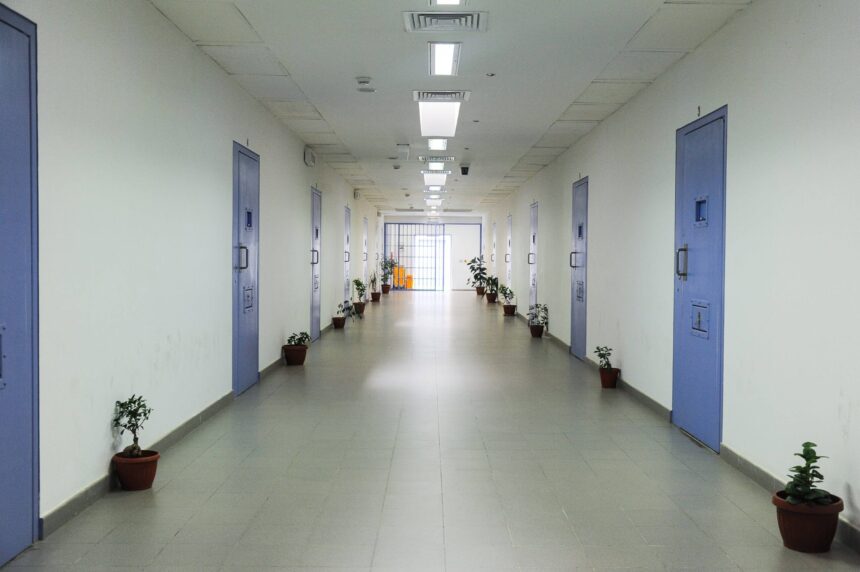It is a January evening in Greenwich, once Britain’s gateway to the world, but tonight taken over by new masters.
The stars of boxing have descended on south-east London. Fighters such as heavyweight world champions Oleksandr Usyk and Daniel Dubois, and super-middleweight champion Canelo Alvarez, walk through the doors of the palatial Old Royal Naval College, tuxedo collars straining atop their muscled necks.
Advertisement
They have been drawn here, to The Ring Magazine Awards, by one man. He is boxing’s most powerful figure, the only individual who can summon this world with a click of his fingers — Turki Al-Sheikh.
During dinner, the 43-year-old sits at the centre of the U-shaped top table next to Frank Warren, one of the sport’s leading promoters, and one seat along from Alvarez, possibly its most marketable star.
Legendary announcer Michael Buffer is flown in from the United States. Some leading promoters are missing cards that they themselves have helped organise — so desperate are they to be in the room.
The Saudi government official stands at the centre of the evening’s iconic photograph, gazing at the camera through his trademark sunglasses. Forty of boxing’s most powerful figures are at his back, posing under the building’s ornate Baroque ceiling, known as Britain’s Sistine Chapel.
It could be read as Al-Sheikh asserting himself at the heart of the British establishment, but this is nothing new for the man who played the Saudi Arabian national anthem at Wembley, English football’s national stadium, last September.
Backed by the enormous chequebook of the General Entertainment Authority (GEA), the government department that Al-Sheikh heads, Saudi Arabia has taken over boxing. Once, the sport struggled to arrange clashes between its brightest stars, but Al-Sheikh has played matchmaker for bouts that had scarcely ever felt like they would happen.
He has even purchased a substantial slice of boxing’s media — buying the century-old The Ring magazine in November 2024, before purchasing the X account of another journalist, which had more than 300,000 followers, and rebranding it as the official Ring Magazine account.
“It’s not about the money,” Terence Crawford, one of the world’s best pound-for-pound boxers, told ESPN last year. “Turki is succeeding because he treats boxers like friends and partners, not enemies to be exploited. He is here to fix the greatest sport in the world. And he will do it.”
Advertisement
Aside from the surface details of Al-Sheikh’s government role, and the tightness of his relationship with the country’s ruler, Mohammed bin Salman (MBS), little is widely known about the man at boxing’s beating heart.
Over the past six months, The Athletic has interviewed more than 40 people across boxing, the Saudi Royal Court, and international business. The vast majority spoke anonymously — some for fears over their own security, others so they could discuss sensitive issues candidly or protect business relationships.
They paint a picture of a man who operates as a glitzy promoter on the global stage, but who is central to a regime that rules with an iron fist back home. Multiple people have told The Athletic:
- The number of people detained for sending critical tweets about Al-Sheikh led to one area of a Riyadh jail becoming known by prisoners as the ‘Tutu Wing’, referring to his nickname.
- Al-Sheikh has a close relationship with MBS, formed in the early 2000s over video games such as League of Legends and Assassin’s Creed during the crown prince’s late teens.
- Al-Sheikh was a key on-the-ground operator during MBS’ rise to power.
- He has developed a reputation within Saudi high society for throwing embarrassing tantrums.
- He is set for key role in planning for the 2034 football World Cup, is a rival of Newcastle chairman Yasir Al-Rumayyan and was offered a stake in Serie A club Milan.
- One of Al-Sheikh’s entourage during preparation for a recent world heavyweight championship fight appeared to be a man wanted by the FBI as a suspected spy.
- The Egyptian singer Amal Maher disappeared from public view for two years after reportedly filing a police report accusing Al-Sheikh of assault. No charges were brought against Al-Sheikh.
Al-Sheikh did not respond when contacted by The Athletic.
“Boxing has always attracted those characters,” says one former fighter-turned-trainer. “But you won’t hear it from anyone in the sport. Everyone’s got their head in the trough.”
Behind the ringwalks, the golden belts, and the dark sunglasses, this is the Turki Al-Sheikh that few people know.
They say that going to Al-Ha’ir Prison is like going behind the sun.
“It’s a saying I’ve heard since I was little” says one former prisoner. “Once you’re there — you’re gone.”
Located in the desert 25 miles south of Riyadh, little about it has been publicly revealed, but Al-Ha’ir is thought to house about 5,000 prisoners. Among Al-Qaeda members, purged princes and common criminals, one part of the jail has developed a reputation.
“There was a group of people we’d call Turki’s victims,” says a former prisoner, who was incarcerated for criticising the government on social media. “‘What’s your case?’ ‘Oh, I’m one of Turki’s victims, I criticised Turki Al-Sheikh.’ Turki’s nickname is Tutu — so we called it the Tutu Wing.
Advertisement
“I knew one guy who replied to one of Turki’s tweets complaining that his team lost. He had nothing to do with politics — he was a football fan. And he said he was imprisoned just for that tweet.”
Sources differ over the extent of Al-Sheikh’s personal knowledge of and involvement in the arrests. Some make the point that there are many people working under him, all desperate to please. Others, including former detainees and those who have worked closely with them, claim that Al-Sheikh himself has been involved in at least some of the detainments.
A cell block in Al-Ha’ir prison in May 2016 in Riyadh (David Degner/Getty Images)
Abdullah Alaoudh, senior director for countering authoritarianism at the Middle East Democracy Centre (MEDC), a non-profit advocacy organisation based in the United States, has worked on verifying the claims of those imprisoned for criticising Al-Sheikh over the past decade.
“We have personally verified either the charges against or sentences of more than 10 cases of people being detained in Saudi Arabia for criticising Turki Al-Sheikh,” he tells The Athletic, explaining their claims have been cross-referenced with official court records.
“Most of the victims were people who didn’t even criticise the government, but who criticised decisions Al-Sheikh made regarding entertainment or sport during his time at both commissions.”
The Athletic has communicated via an intermediary with one man who says he was rung by an anonymous number. The caller identified themselves as state security, and ordered the man to meet them at a public location. He was subsequently bundled into a black SUV by masked men, before being blindfolded, handcuffed and driven to Riyadh.
When the man reached his destination, he claims the blindfold was taken off to reveal an opulent room and Al-Sheikh entered.
Allegedly, Al-Sheikh asked the man why he had criticised him on social media. Earlier that day, he had accused Al-Sheikh, in his role as chair of the Saudi sports ministry, of bias. He had only a handful of followers.
Advertisement
The man claims he was slapped in the face three times by Al-Sheikh, who ordered him to delete the post or be imprisoned. Begging, the man agreed — he was released in the middle of the highway and told to figure out his own way home.
“Al-Sheikh behaves like this because he has the power,” says Alaoudh, whose father Salman, an Islamic scholar, has been detained in Saudi Arabia since 2017 for criticising the government. “There’s no rule of law — it’s an autocratic and absolute monarchy with no oversight from the judiciary or from legislators.
“There are two cases that we’ve been told about where he is said to have offered thousands of Saudi riyals in payment, or made payments, to keep these people from speaking about what happened to them, to not mention it to anyone or any organisation.”
In September 2019, Islamic scholar Omar Al-Muqbil was arrested after claiming that the policies of Al-Sheikh’s GEA threatened Saudi culture. According to NGOs, he remains in prison despite his sentence concluding last March. That October, a tribal leader, Faisal Bin Sultan Bin Humaid, was imprisoned for five months after tweeting criticism of Al-Sheikh.
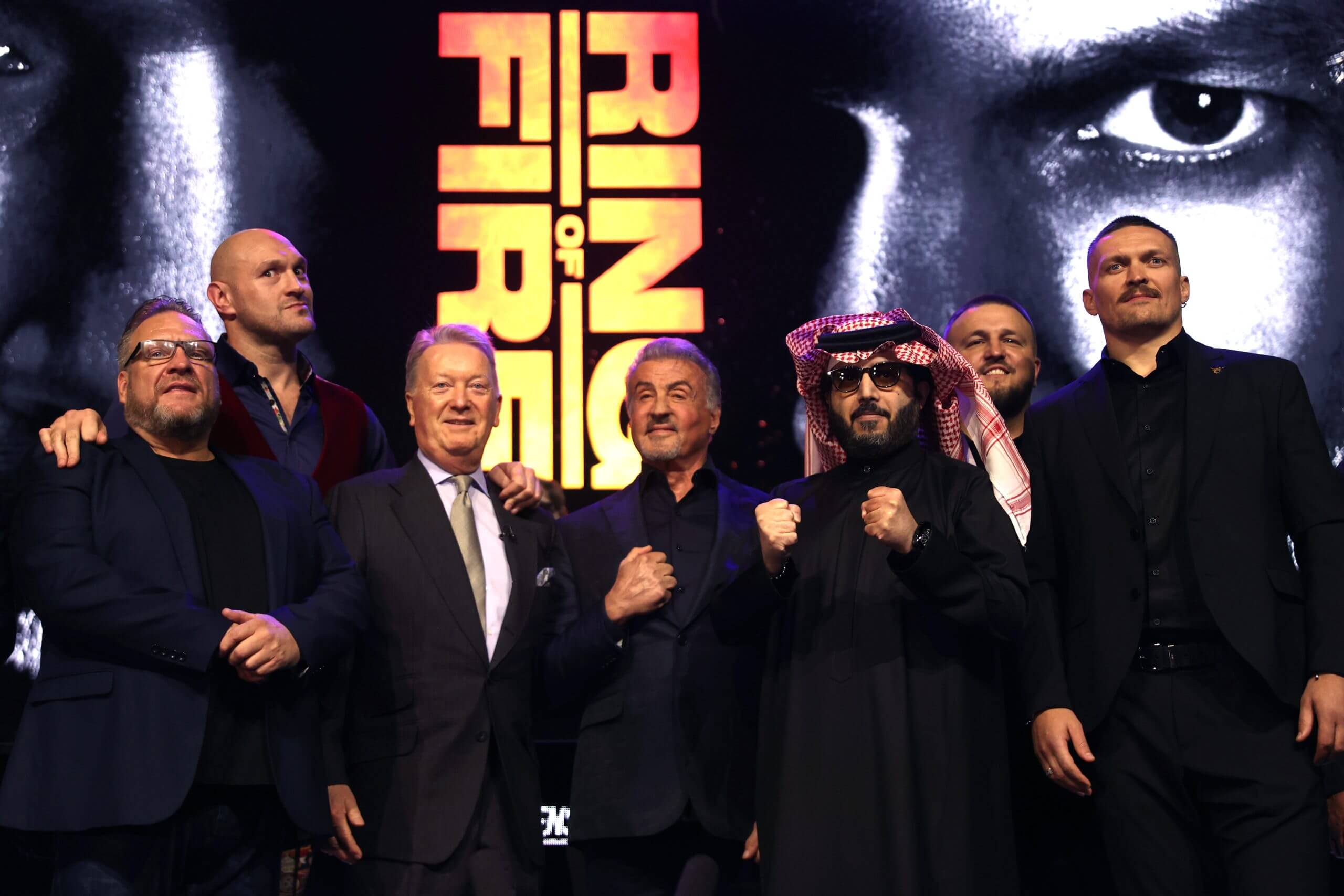
Al-Sheikh poses with Sylvester Stallone at a London boxing event in 2023 (Alex Pantling/Getty Images)
“Al-Sheikh might seem secure, but he knows how quickly someone like MBS can turn,” says one person familiar with Royal Court matters. “So there’s this constant sense of feeling like they need to stamp out personal criticism so that it doesn’t snowball into MBS thinking they’re incompetent or cause trouble.”
Ahmed Mohamed Omar was a fan of Egyptian club Al-Ahly, a club Al-Sheikh had invested in. When he moved to Saudi Arabia for work in 2021, he was detained for tweets sent 18 months earlier in which he had criticised Al-Sheikh’s decision-making. According to the MEDC, and verified too by other human rights groups, Omar was sentenced to 19 years in prison. His family say they have exhausted their legal options.
“Conditions in Saudi Arabian prisons are generally poor,” adds Alaoudh. “Those who are detained for a short amount of time usually receive more physical harm. The violence ranges from beatings by prison guards, to a slap on the face, to, in extreme cases, being hung upside down by your heels. All of these have been documented (by the MEDC) in cases where prisoners were detained for criticising Turki Al-Sheikh.”
It seemed unlikely, growing up in suburban Riyadh, that Al-Sheikh would ever wield this level of power.
Born in 1981, Al-Sheikh’s parents held middle-class jobs — his father was a civil servant at the Ministry of Youth, while his mother was a school principal. The family lived in his grandparents’ home, with Turki remaining there until he was in his late twenties. “An average family,” he described on a Kuwaiti podcast in January 2024.
من 41 سنه … 🤷🏻♂️❤️ pic.twitter.com/xVP85oJENH
— TURKI ALALSHIKH (@Turki_alalshikh) September 7, 2024
One thing less average was his name — Al-Sheikh — denoting him as a member of one of Saudi Arabia’s most powerful families, second only in prestige to the ruling Saud dynasty. Historically, the Al-Sheikhs have dominated the religious hierarchy, with its members, including Turki, claiming descent from the founders of Wahhabism, the nation’s dominant faith.
Advertisement
Turki hailed from a minor branch of the sprawling family, meaning his upbringing was still relatively ordinary — though his name would prove significant in the years to come.
Following school, his father sent him to the King Fahd Security College for a career in the military. One teacher remembered him as an unspectacular student, more focused on making his cohort laugh than knuckling down.
Al-Sheikh was given a job in the state security department when he graduated as a lieutenant in 2001, where he worked in an administrative role, having been allocated to the procurement department, monitoring spreadsheets and ordering supplies.
The key break of his career came a few years later. In Saudi Arabia, major royals have retinues and security details. Al-Sheikh was reassigned to the office of Salman, governor of Riyadh — the man who would become king of Saudi Arabia over a decade later.
At this point, Salman was not expected to take the throne and, in Salman’s court, Al-Sheikh quickly grew close to his seventh son, who was just four years his junior. According to people with knowledge of the Royal Court, the pair played video games — League of Legends and Assassin’s Creed were favourites — and spent hours late at night watching WWE.
Back then, this teenager was simply Mohammed, but now, his status as the most powerful figure in the Middle East means he is known by shorthand alone — MBS.
Al-Sheikh was an influential figure for the future crown prince. Royal insiders tell stories of how, when MBS was grounded by Salman, Al-Sheikh would sneak him out of the palace to explore Riyadh. Their early relationship has been described by various sources as a “bromance”.
“Turki has very awkward but appealing and funny social skills,” says one person familiar with the Saudi Royal Court. “And he was the party guy — he’d arrange the parties and find the musicians, and whatever else was needed.”
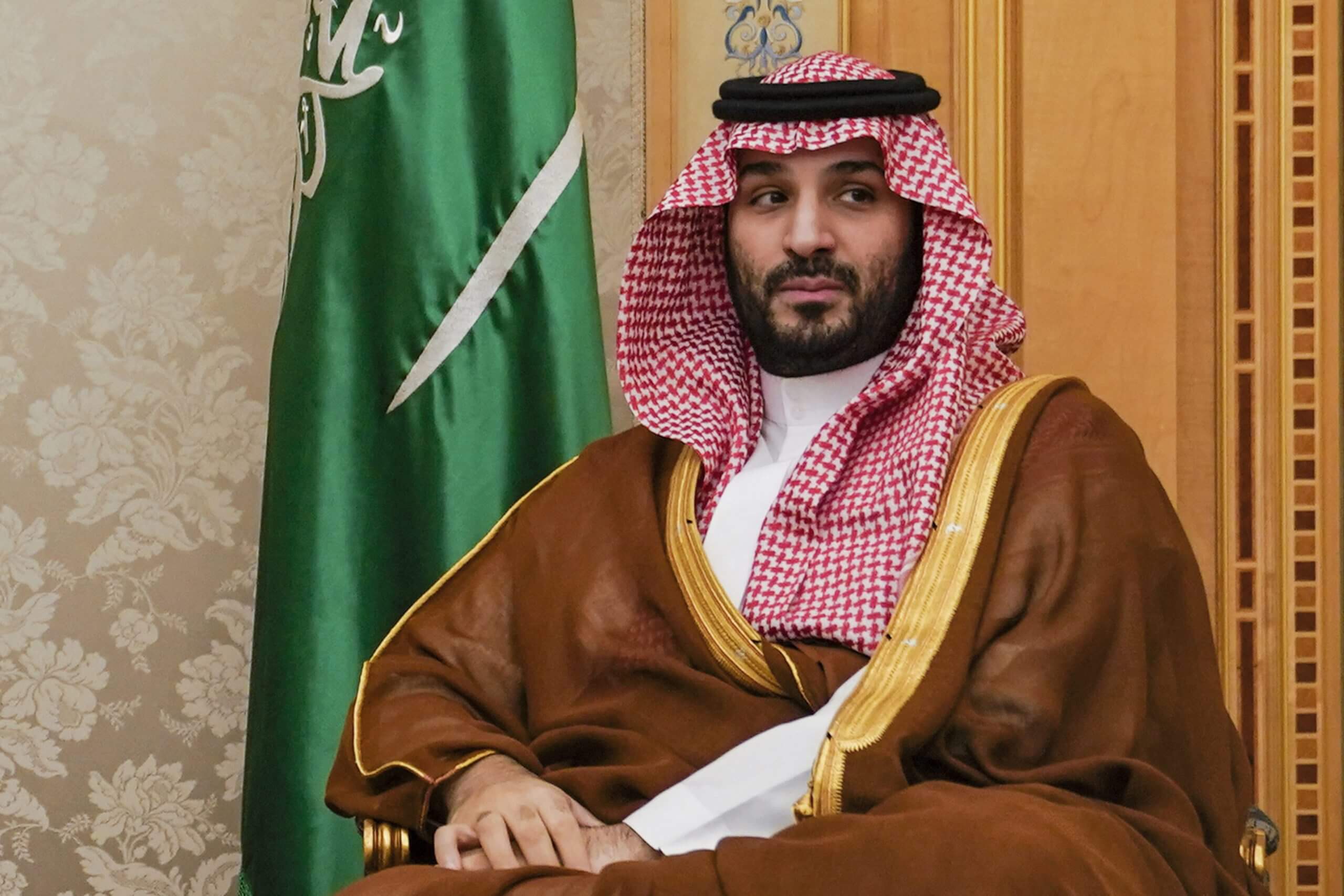
Al-Sheikh bonded with MBS (NATHAN HOWARD/POOL/AFP via Getty Images)
But Al-Sheikh still lacked money. In posts which have subsequently been deleted from his X account, Al-Sheikh described only being able to afford a single sandwich from his favourite store, and needing to sell jewellery to pay his wedding dowry.
Yet he maintained close relationships with power, marrying the daughter of Salman’s chief of staff. MBS was invited to the wedding alongside some of Saudi Arabia’s most powerful religious figures.
Advertisement
Gradually, moving between governmental roles according to Salman’s interests, Al-Sheikh’s interpersonal skills began to establish him in Saudi high society. Once anchored to a prince, a courtier’s stock tends to rise and fall with that royal.
“He is very smart in terms of knowing Royal Court politics,” says one palace insider. “He has the smartest thermostat. He knows exactly when MBS is angry, and he will maintain distance, but he also knows exactly when the opportunity is to come close.”
It was only when Salman’s older brother died in 2015, the then-King Abdullah, that hard power appeared at Al-Sheikh’s fingertips.
MBS moved quickly to ensure that the line of succession crowned Salman rather than any of Abdullah’s sons, removing allies of rival branches from government positions before the king’s death was even formally announced. MBS needed trusted figures to help him consolidate power.
The primary competition for the throne came from Salman’s nephew Muhammad bin Nayef, known as MBN. Salman initially named him as crown prince, his successor, to appease squabbling family dynamics.
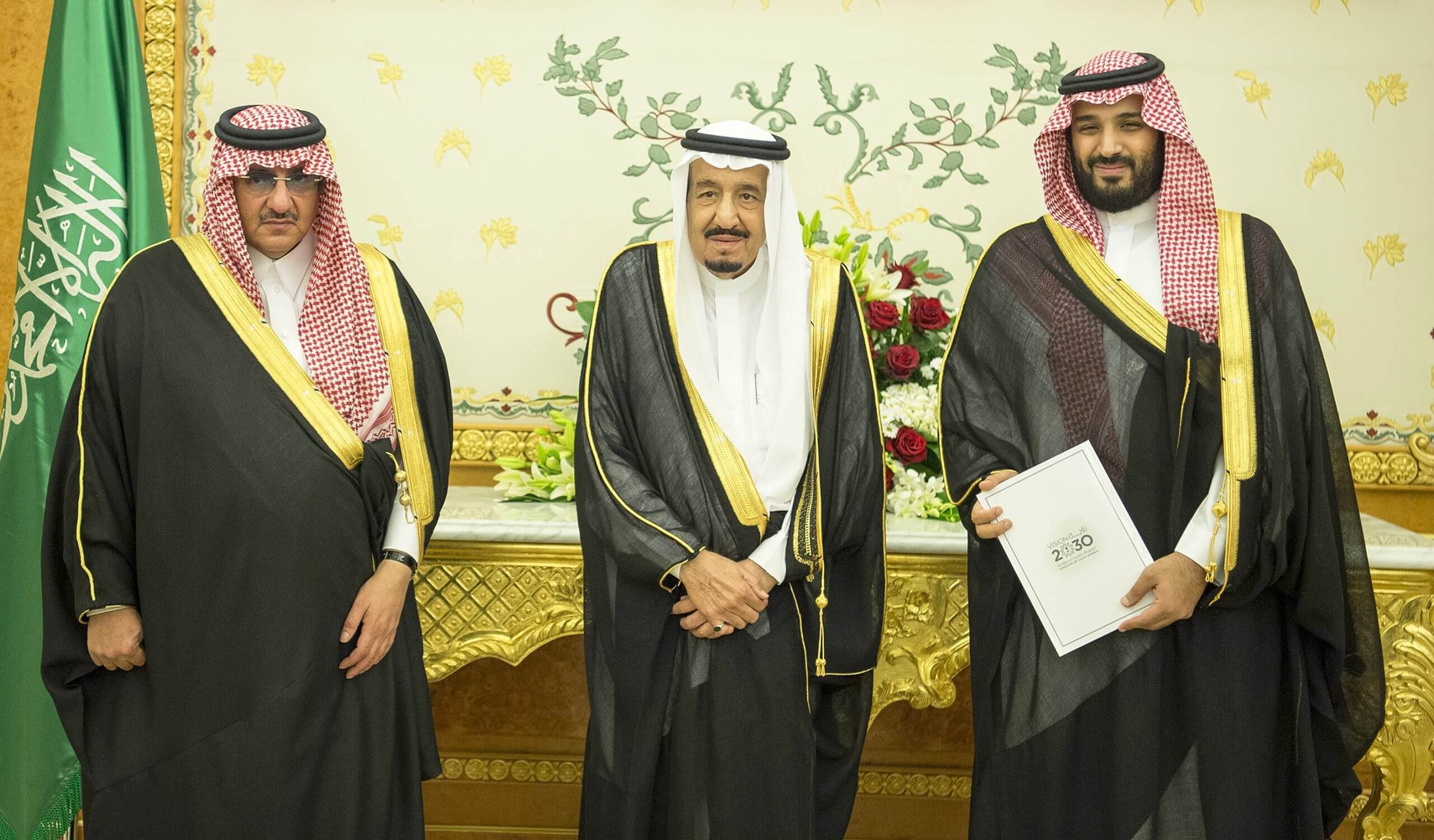
MBS (right) and Muhammad bin Nayef (left) in 2016. The next year MBN was pressured into stepping down as crown prince (Pool / Bandar Algaloud/Anadolu Agency/Getty Images)
In 2017, two years after Salman assumed power, MBN was ushered into a room in the Al Safa Palace in Mecca. There was Al-Sheikh, alongside other MBS loyalists, demanding that MBN step down as crown prince.
Video footage released by Saudi state television shows a dazed-looking MBN shaking hands with MBS the next day, transferring power. Al-Sheikh slips into shot to place a black bisht, a type of robe, onto MBN’s shoulders. After all that had happened over the previous 24 hours, this was supposed to convey respect.
“When I pledged allegiance, there was a gun to my back,” MBN later texted an advisor, according to a person familiar with the exchange and as previously reported by The Guardian.
Al-Sheikh continued to prove his usefulness. MBS’s most infamous act domestically has become known as the Ritz-Carlton purge — rounding up more than 300 prominent businessmen and minor royals, before imprisoning them in a Riyadh hotel. There, they were stripped of assets in what was publicly described as an “anti-corruption drive”.
Advertisement
Again, according to multiple sources with knowledge of what unfolded, Al-Sheikh played his part. Other major publications, such as The New York Times, have made similar claims about Al-Sheikh’s presence.
“People that were tortured at the Ritz-Carlton, they recognised him,” claims one person, who was briefed on proceedings by some of those detained. “In some of the sessions, they would hear him and another guy in the background smoking shisha. They could hear the bubbling, and the background music they were playing, while the sessions were going on.”
With MBS’ position secure, Al-Sheikh’s role began to change. In 2018, he moved from the General Sports Authority (GSA) to the General Entertainment Authority (GEA), after the previous head was fired for hiring Cirque du Soleil-style performers who were deemed too risque.
“It’s bread and circuses,” says one dissident of the GEA. “The rulers have to put food on the table and get the people entertainment to disguise the fact that they’re even more autocratic than before, and to quell any form of dissent.”
After the 2018 killing of journalist Jamal Khashoggi by agents linked to the Saudi state, Al-Sheikh wrote and publicly circulated a song proclaiming the innocence of Saud al-Qahtani, the MBS adviser held responsible by inquiries held by the CIA, MI6 and Turkish authorities.
Khashoggi stated privately in the months before his death, in quotes subsequently reported by Newsweek, that Al-Sheikh and Al-Qahtani were MBS’ only political advisers. “They are very thuggish,” Newsweek reported him as saying. “People fear them. You challenge them, you might end up in prison.“
Al-Sheikh has spoken of writing his own poems and songs. In April, it was announced that he would produce a UFC-based film named Brawler with the organisation’s president Dana White. Previously, in 2023, he wrote a horror film, The Cello, starring Jeremy Irons and made by Darren Lynn Bousman, director of four of the films in the Saw series. According to movie database IMDb, the budget for The Cello was $17m — but it grossed just $5,310 in cinemas.
He invested heavily and controversially in Egyptian football between 2017 and 2019 — buying a club, renaming it Pyramids FC, and moving it Cairo — before buying second-division Spanish club Almeria for €20m (£17.2m).
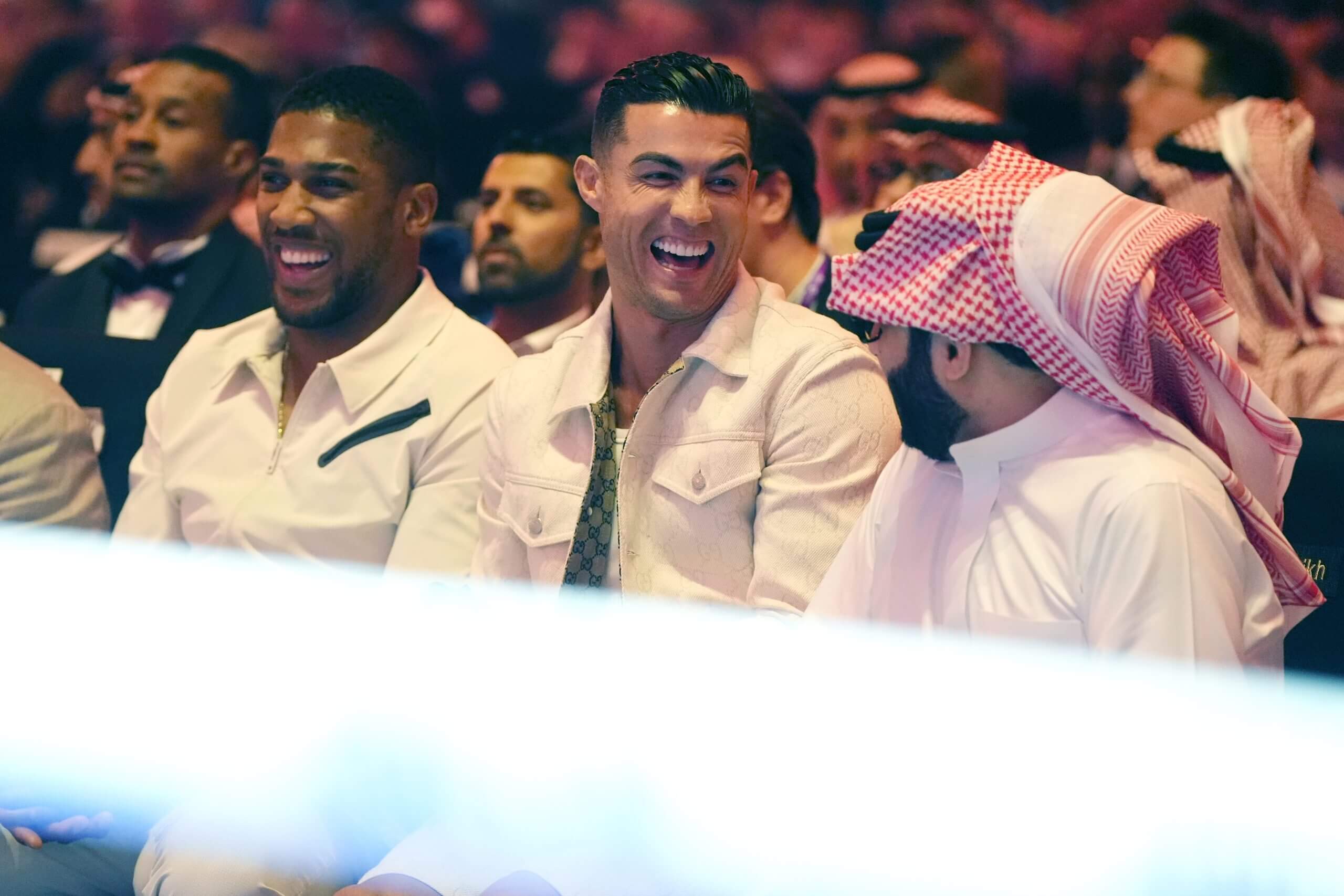
Al-Sheikh sits ringside in Riyadh next to Cristiano Ronaldo, who now plays in Saudi (Nick Potts/PA Images via Getty Images)
Later, he claimed on his Kuwaiti podcast appearance that he held discussions with an unnamed Premier League club over a purchase, and that the late super agent Mino Raiola had offered him the opportunity to take a stake in Milan.
As part of his duties at the GEA, Al-Sheikh has hosted a series of high-profile raves and music festivals in the desert, intended to modernise the country and appeal to a rapidly growing young population.
Advertisement
“I think he has one of the most complex jobs in Saudi Arabia, by far,” says one expert on the country. “He’s directly on the front line against the religious authorities that were previously dominating social life. And his name is an important political card — that it’s an Al-Sheikh who has brought dancing girls to Riyadh.”
But Al-Sheikh has also drawn attention for a succession of public outbursts, many over issues that appear petty.
On one occasion, during the Covid-19 pandemic, Al-Sheikh organised a charity video-game match against former Al-Nassr owner Saud al-Suwailem. Playing as Almeria, his team, in FIFA 20, Al-Sheikh conceded two goals in the opening minutes — and responded by throwing his controller at the television, breaking it completely.
لو كان شخصا عاديا لما جذب انتباه أحد اغضبه وكسره جهاز التلفزيون لأنه خسر لعبة الكترونية، ولكن أن يكون مستشارا ل #ولي_العهد والملك القادم لأكبر دولة مصدرة للنفط فذلك يستوقف العالم بأسره🤔لذلك لا استغراب لأفعال #مبس الطائشة الحمقاء #السعودية #عيدكم_مبارك #خليك_بالبيت #فيروس_كورونا pic.twitter.com/xkDihbxddM
— ناصر بن راشد النعيمي (@AlnuaimiNasser1) May 23, 2020
In 2019, he was filmed flying into a rage at a cameraman who had gotten too close.
At the 2018 World Cup, Al-Sheikh released a video after Saudi Arabia lost 5-0 to hosts Russia in the tournament’s opening game. There, he exclaimed repeatedly that the team had “blackened his face”.
Earlier that year, Al-Sheikh sparked a diplomatic incident after calling a Kuwaiti government minister a “mercenary” for thanking Qatar, after their regional rival helped Kuwait lift a FIFA ban on the nation.
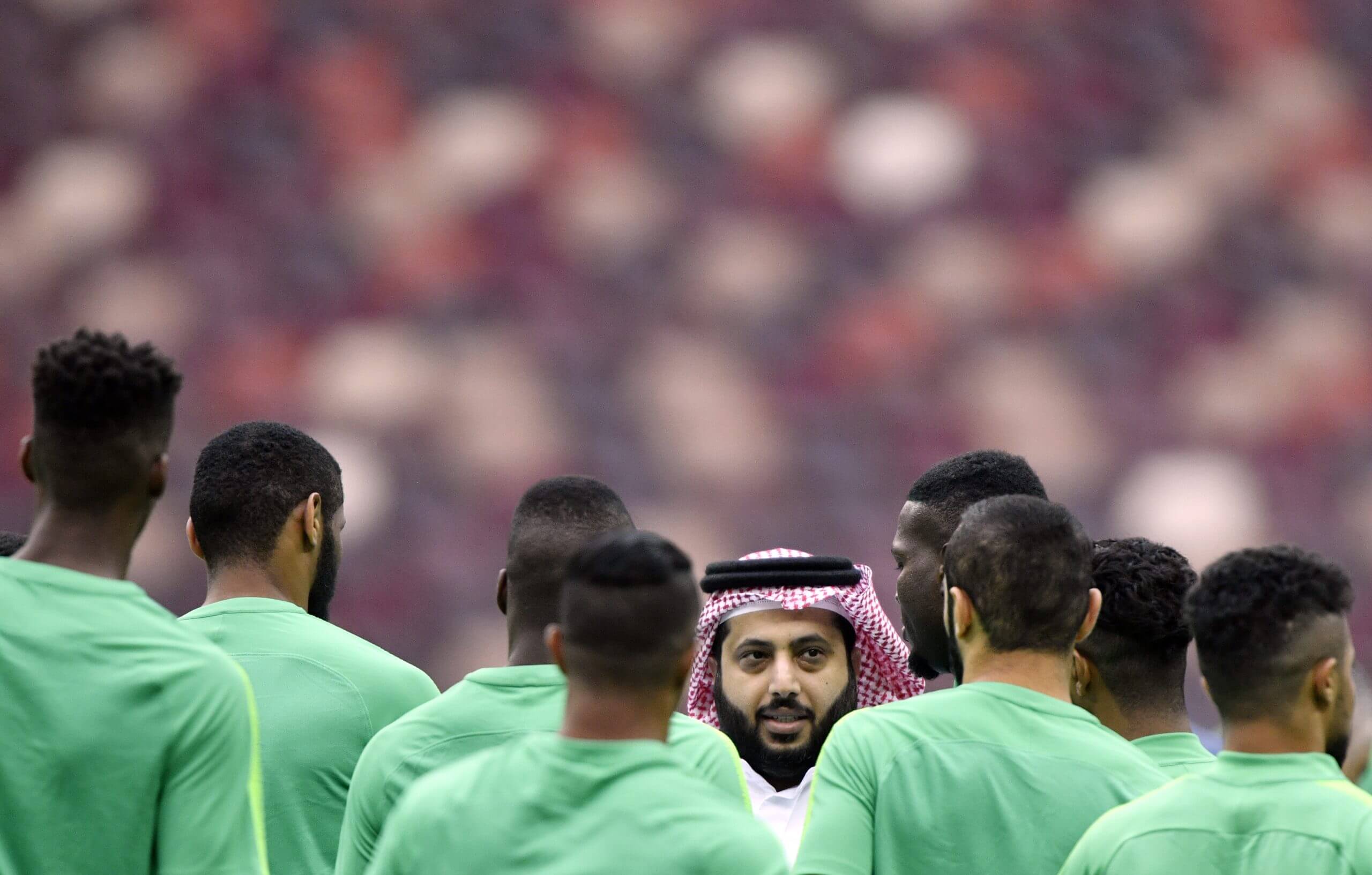
Al-Sheikh with Saudi Arabia’s football team before the 2018 World Cup in Russia. (Alexander NEMENOV / AFP)
“This is the speciality of MBS’ top advisors,” says one source close to Saudi politicians. “They create problems, and Daddy has to come to the rescue… This gang around MBS is all-powerful. Nobody wants to touch Turki Al-Sheikh.”
Al-Sheikh has also encountered controversy outside Saudi Arabia. One incident, which took place during Al-Sheikh’s time in Egypt, concerns one of the country’s most famous singers, Amal Maher.
In March 2018, several Egyptian publications reported that Maher had filed a complaint to police, alleging she was punched in the eye by Al-Sheikh and left with a black eye.
Advertisement
Over previous weeks, Maher had publicly denied fervent speculation that she was engaged to Al-Sheikh, whom she had met through his close connections with the Egyptian entertainment industry.
According to police sources quoted by the Egyptian media, Maher’s report was referred to the Public Prosecutor, and the Saudi Embassy in Cairo was notified of Al-Sheikh’s need to appear before investigators. Video footage, taken the next day, appeared to show Maher and her brother entering the South Cairo Court in the Zeinhom area of the city.
Within four hours of release, the initial two publications to have broken the story had their websites blocked. When they returned, the stories about Maher had been deleted.
Over the coming days, Maher’s brother’s shop was damaged, while she cryptically stated on social media, in subsequently deleted posts, that she “would never accept wrongdoing for myself”, without elaborating further. She also claimed that she and her family had received “threats and insults” on their mobile phones.
Following an appearance at the Giza Pyramids in June 2020, Maher was not seen in public for more than two years. During that period, her songs disappeared from YouTube, while she announced in June 2021 that she had retired from music due to “personal circumstances outside her control”.

Maher was not seen in public for two years (FETHI BELAID/AFP via Getty Images)
An Egyptian MP, Amal Abdel Hamid, published a letter to the prime minister in June 2022, stating: “It is unfortunate, suspicious, and also frightening, that the absence of a female singer the size of Amal Maher turns into a question, controversy, rumors and suspicion. What is more unfortunate is insisting on silence and ambiguity, and creating an atmosphere of rumors.”
Al-Sheikh never commented publicly on the allegations and no case was ever brought against him.
Police in Egypt did not respond to queries raised with them by The Athletic.
Advertisement
In recent years, Maher has begun performing in Saudi Arabia once again. She has publicly released statements denying that she was assaulted by Al-Sheikh, and explaining that her long public absence was due to complications from Covid.
“Sorry for the last period, I was not able to be with you,” she said on a video on Instagram. “I had coronavirus, but, thank God, I recovered and I wanted to reassure you.”
The 2034 World Cup will be the largest sporting event in Saudi Arabia’s history and Al-Sheikh will play a key role, sitting on the tournament’s planning committee.
His true love, however, is boxing.
In recent years, Al-Sheikh has suffered serious health issues. He was diagnosed with several forms of cancer from 2015 onwards, the most serious of these a tumour located in his brain, close to his pituitary gland. He spent much of 2018 and 2019 in New York for treatment.
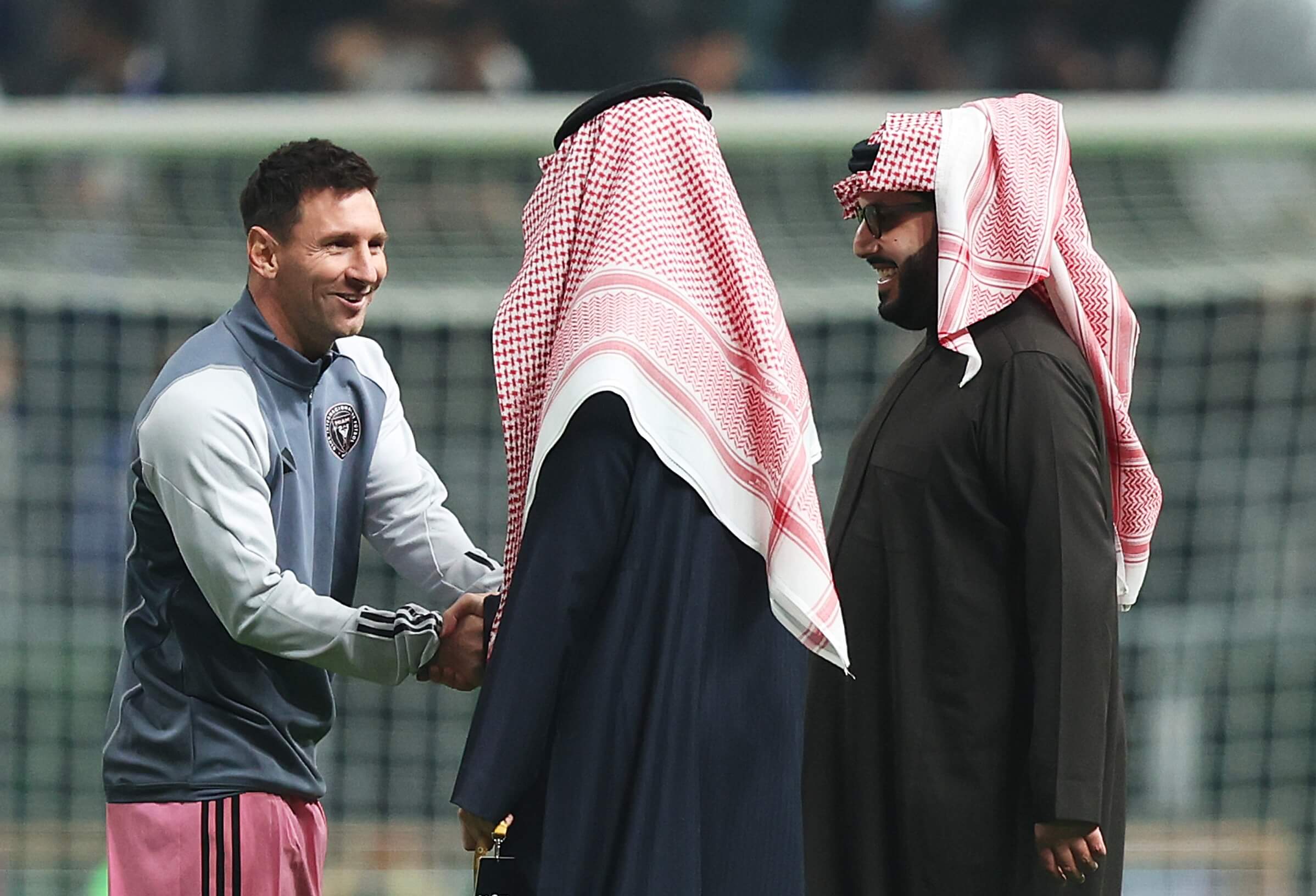
Al-Sheikh, with Lionel Messi last year, is involved in Saudi Arabia’s 2034 World Cup planning (Yasser Bakhsh/Getty Images)
Speaking to Kuwaiti podcaster Ammar Taqi, Al-Sheikh said that one operation resulted in a medical error, leaving him with a wound which bled for 50 days, before months of inflammation.
According to Al-Sheikh, his second life now has two purposes. To serve MBS — and to serve boxing.
This affection for the sport is genuine. His favourite fighters — Larry Holmes and Roberto Duran — are not necessarily the first you would expect, particularly because their careers had wound down by his childhood.
When experienced British trainer Joe Gallagher revealed in February that he had been diagnosed with stage-four liver and bowel cancer, Al-Sheikh had already been in touch after hearing of his illness via the boxing grapevine. He offered to help in any way he could, including putting Gallagher in touch with specialists he had met during his own treatment. Eddie Hearn, another of the sport’s most powerful figures, tells a story of being summoned from swimming in the sea while on holiday, such is Al-Sheikh’s pull.
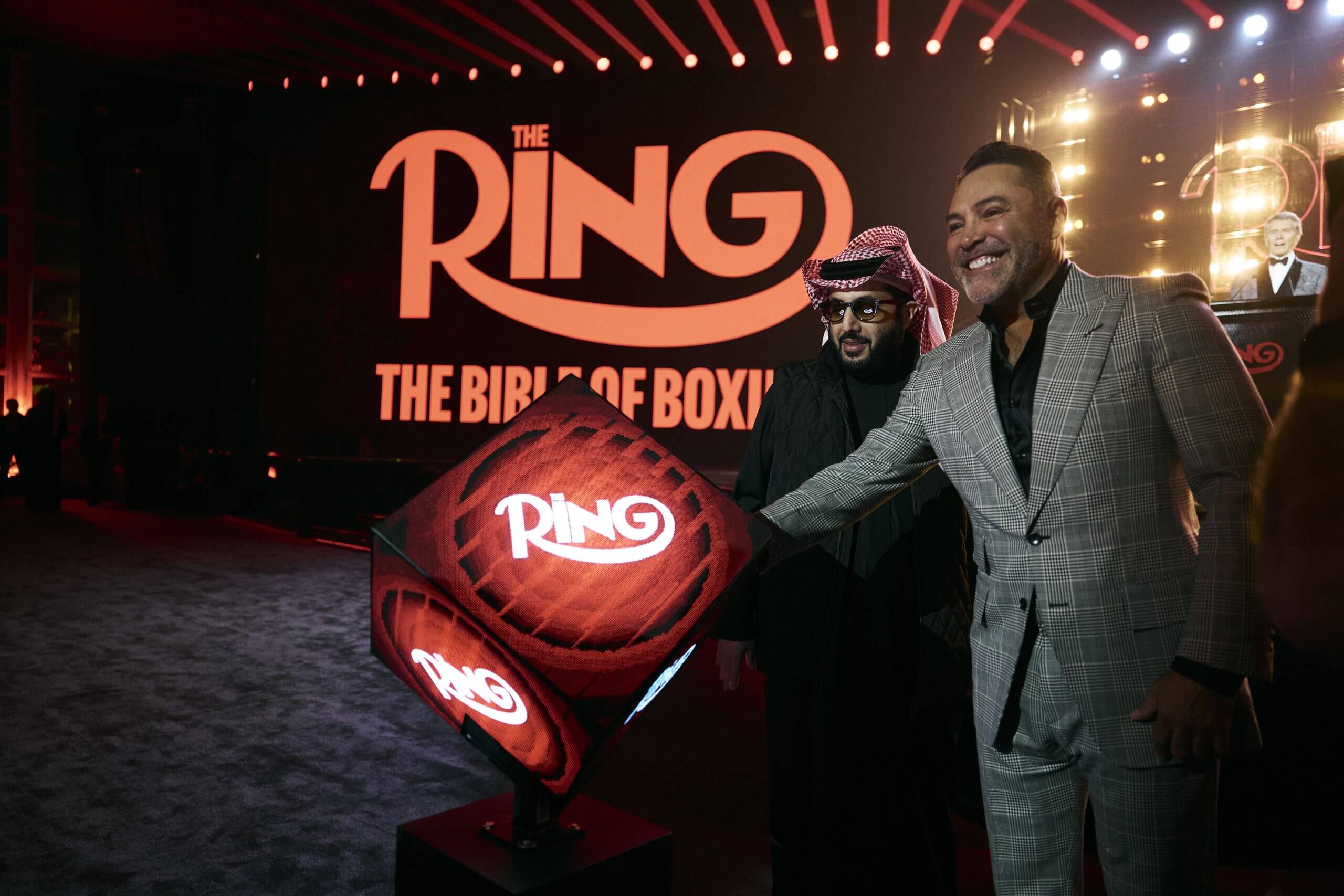
Al-Sheikh and former star boxer Oscar De La Hoya in Riyadh last year (Mark Robinson/Matchroom Boxing/Getty Images)
He pushed for Saudi Arabia to begin investing in boxing after returning from his cancer treatment, building on Anthony Joshua’s high-profile fight with Andy Ruiz Jr in December 2019. The events soon began to intensify as they officially fell under the Riyadh Season banner, the GEA’s flagship slate of events encompassing both sport and culture unlocking funding with it.
Advertisement
Difficult fights were brokered — including boxers such as Tyson Fury, Deontay Wilder, and Oleksandr Usyk — while the two world championship meetings between light-heavyweights Artur Beterbiev and Dmitry Bivol were the sport’s highest-class bouts of recent years.
In social media videos posted online by Al-Sheikh in October 2024, showing preparations for the upcoming Riyadh Season, there appeared nothing remarkable about the presence of a slight figure with a short-trimmed beard.
🇸🇦❤️💪🏻 pic.twitter.com/mzcZfEpkbr
— TURKI ALALSHIKH (@Turki_alalshikh) October 11, 2024
However, people familiar with the Royal Court say this man appears to be Ahmed Al-Mutairi, also known as Ahmed Aljbreen. In November 2019, he was accused by the FBI of acting “as an unregistered agent of a foreign government” by recruiting workers at Twitter to leak information about suspected dissidents.
FBI investigators allege that Al-Mutairi “convinced (two other workers) to use their employee credentials to gain access without authorization to certain nonpublic information about the individuals behind certain Twitter accounts”.
1/4 #FBI San Francisco is seeking Ali Alzabarah (https://t.co/DbJ5RvefJu)and Ahmed Almutairi (https://t.co/Hg0xEfJE2i) for allegedly acting as unregistered agents of a foreign government pic.twitter.com/ZMUE0nYFvK
— FBI SanFrancisco (@FBISanFrancisco) November 7, 2019
They added: “Specifically, representatives of the Kingdom of Saudi Arabia and the Saudi Royal Family sought the private information of Twitter users who had been critical of the regime… private user information included their email addresses, phone numbers, IP addresses, and dates of birth.”
At the time, Twitter released a statement asserting their commitment to “protecting the public conversation” from abuse by nation states.
The FBI has confirmed to The Athletic that Al-Mutairi remains a wanted man.
Al-Sheikh is the sports magnate in charge of delivering Saudi Arabia’s soft power events, both domestically and internationally, yet also has extensive links with the hard power of MBS’s court, which situates the nation as a human rights pariah.
His trust, across both roles, shows his value to MBS, but it heightens his vulnerability.
Advertisement
Al-Qahtani, one of Al-Sheikh’s only equals in closeness to MBS, disappeared from view after Khashoggi’s murder, only reappearing in public over the past year. So far, Al-Sheikh’s place at MBS’ side has never been seriously questioned.
“I think MBS thinks Turki is a visionary guy on the entertainment side,” says one person familiar with the Royal Court. “He’s creating this image of a country which screens Marvel and Avengers movies, and has Dragon Ball Z theme parks. It’s really what he had in mind — it’s what he played with Turki when they first got to know each other. And basically, Turki made it happen.”
However, multiple sources with knowledge of the power dynamics at play say that Al-Sheikh is currently competing with PIF governor Yasir Al-Rumayyan — the man chosen to lead the Newcastle United project in the Premier League — for MBS’s ear.
According to multiple sources briefed on negotiations, another point of difference has been Saudi Arabia’s $1bn investment in media company DAZN through SURJ, a sports-specific division of PIF. This option was heavily pushed by Al-Sheikh — while Al-Rumayyan preferred to concentrate on a potential deal with Qatari broadcaster BeIN Sports. Al-Sheikh’s proposal won out.
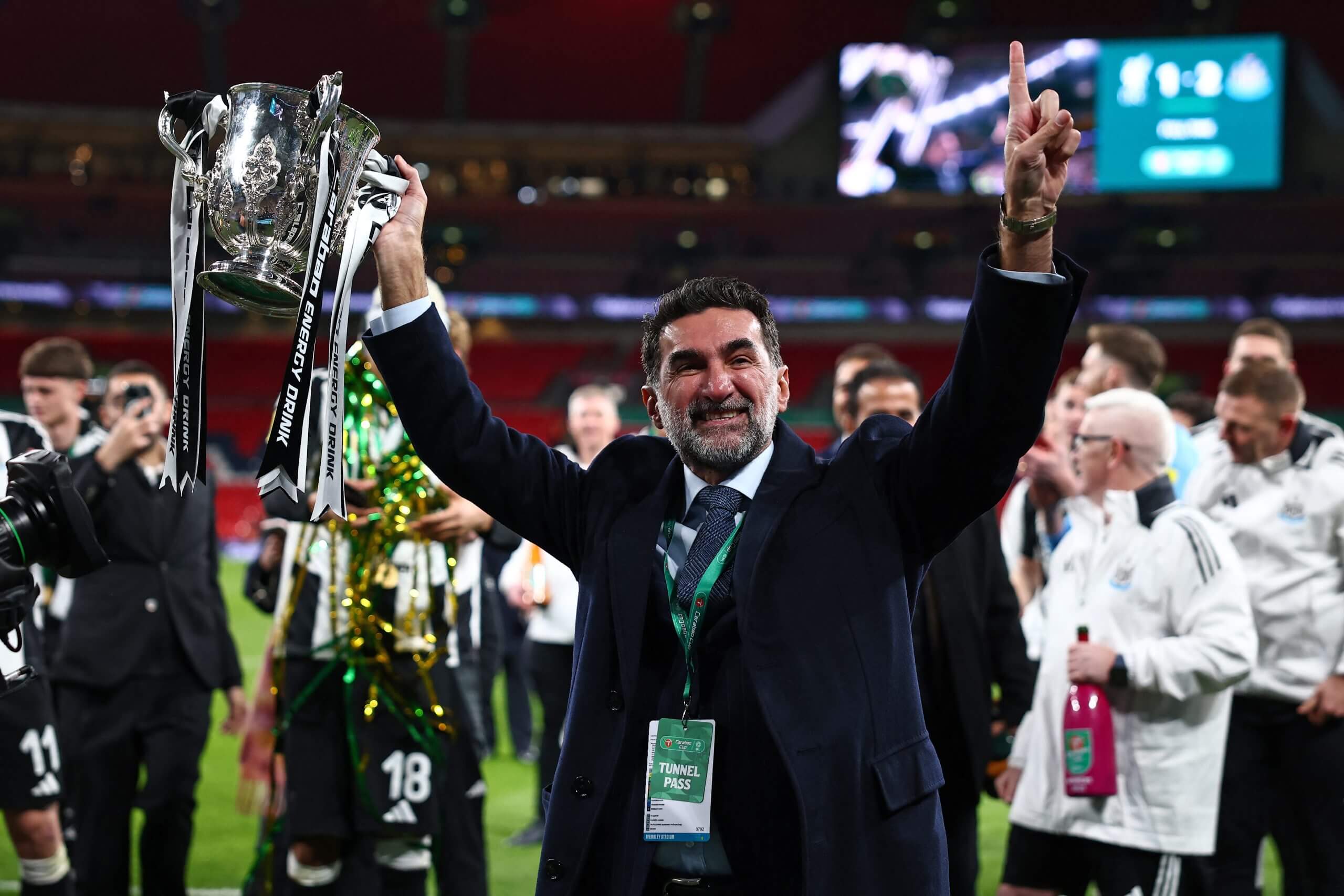
Al-Rumayyan was chosen to be Newcastle’s chairman (Henry Nicholls/AFP via Getty Images)
In recent months, the lack of warmth between the pair has been noticed publicly.
“There was one dinner during Riyadh Season, and there was a big table for the VIPs,” explains one source with extensive links in Saudi high society. “Turki entered the room, and went to the seat which was at the same table as Yasir.
“Yasir stood up, waiting to greet him, and Turki didn’t even look at him. He didn’t speak to him at all. It was clear to everyone there that Yasir was waiting for 30 seconds to be able to sit. The dinner was just about who the leader is. ‘Don’t mess with me. Little by little, I’m going to take your place.’”
Advertisement
For some in Saudi Arabia’s ruling class, Al-Sheikh’s conduct is not compatible with Vision 2030 — a project focused on both diversifying Saudi Arabia’s economy and improving its international image. They feel there has been a lack of return on investment, while Al-Sheikh’s personality — the outbursts and controversy — is not the image MBS wishes to convey.
“Some Al-Sheikhs are ordinary citizens, some are a hair’s breadth from royalty,” says a Royal Court adviser. “They have always had a role in Saudi society. However, they have never played the prince. Turki’s lack of decorum angers many.”
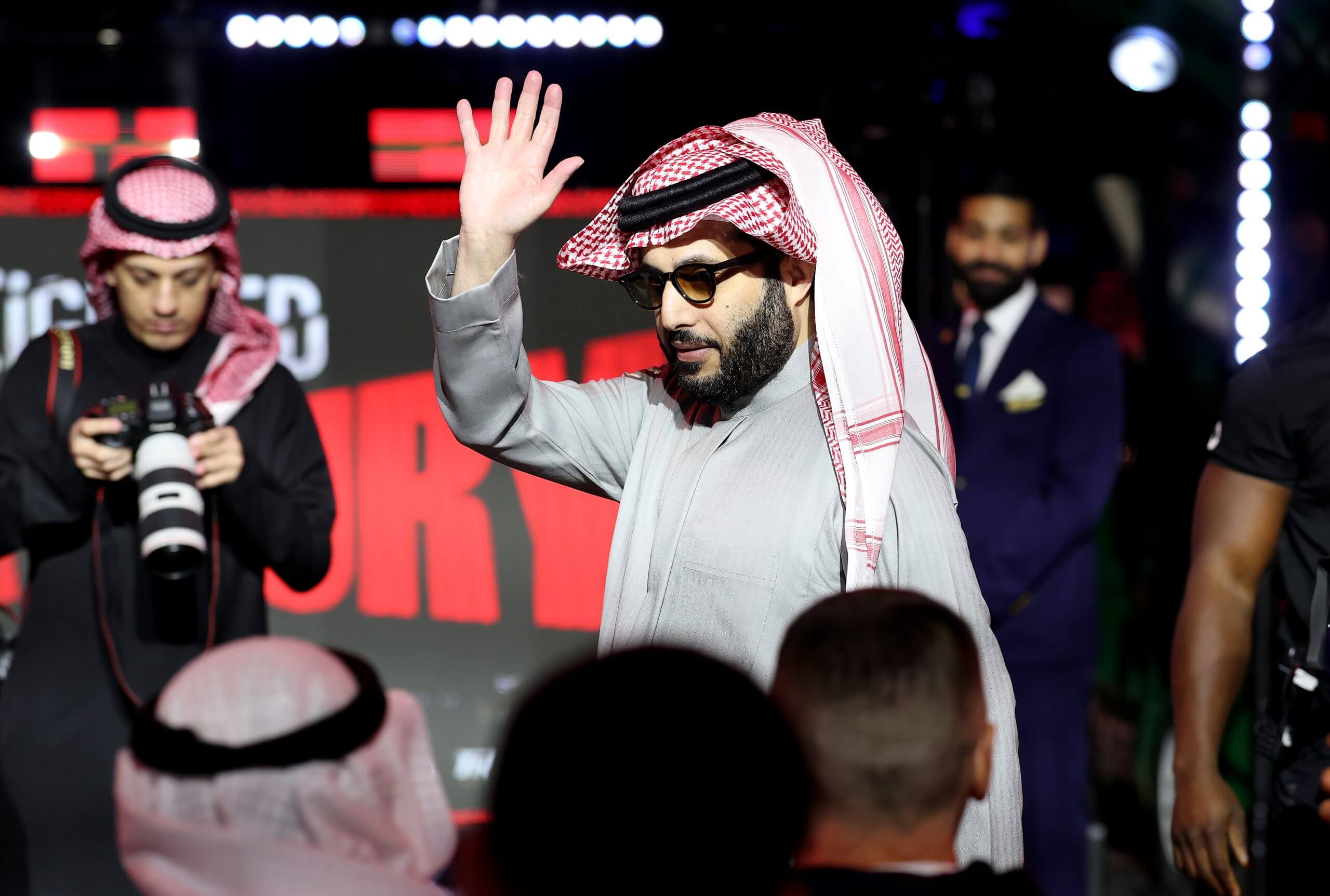
Al-Sheikh has his critics but has transformed boxing (Richard Pelham/Getty Images)
Plucked from middle-management by MBS, all sources agree that Al-Sheikh owes his entire rise to the ruler — he has no pre-existing political strength of his own.
“One day, he will fly too close to the sun,” predicts one person.
But on Saturday evening, Al-Sheikh will be at the centre of the sporting universe once again. The Tottenham Hotspur Stadium in London will host a Riyadh Season bout between Chris Eubank Jr and Conor Benn, sons of rivals from the 1990s, and seen as British boxing’s biggest fight in several years.
Al-Sheikh has risen from obscurity to quasi-royal prominence. He is now at the heart of two historic institutions, whose new guard wants to rip out corruption, invest lavishly, and secure their place in the new world order. Their morality has been widely questioned.
In recent years, Saudi Arabia’s story has also been boxing’s story. Will Al-Sheikh be the man who drives both forwards? Whatever he does next will have implications from Wembley to Riyadh, from Washington to Al-Ha’ir Prison.
Whether behind the sun, or under the unforgiving light of the ring, two worlds await.


